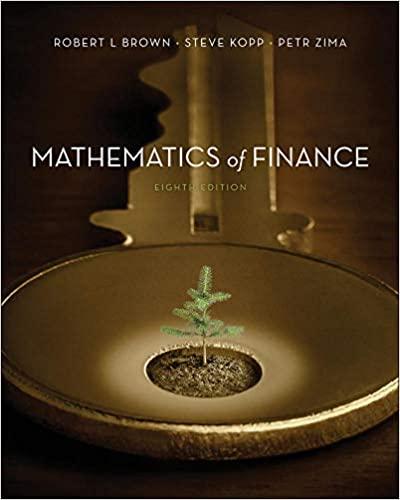Answered step by step
Verified Expert Solution
Question
1 Approved Answer
Please explain and show each step in detail! Part B: For each alternative Alpha for the largest profit is 1.0 Alpha for the smallest profit

Please explain and show each step in detail!
Part B: For each alternative
Alpha for the largest profit is 1.0
Alpha for the smallest profit is 0.0
Tor an example, let is consider the design problem of the Omicron Company. They manufacture borne gardening equipment. Because of the seasonal nature of their product line they build up a large inventory before their selling season begins. They have no way to check and alter their design decisions. (The same effect holds true for Christmas items such as toys and style goods.) Omicron is restyling their plastic tubing used for garden hoses. The design alternatives that they are considering utilize the same facilities as their present product and therefore the problem of limited resources can be neglected. The question that Omicron wishes to resolve is whether to make the plastic hose green, red, or yellow. These are strategies S., S, and S., respectively, and in addition, a fourth strategy-make 50 per cent red and 50 per cent green-is specified and called S. (Of course, many combinations of all colors would be possible and could easily be handled by our methods.) The decision as to the best strategy is strongly influenced by an uncontrollable factor, viz., what color will be in style in the coming year. Estimates are prepared and the data are assembled as follows: Matrix or ESTIMATED SALES VOLUME (IS FEET) 23 S. S, Green Red Yellow Green & Red 100,000 50,000 30,000 125,000 50,000 100,000 10,000 125,000 50,000 50,000 150,000 75,000 S wbere N, is the state of nature, red is in style; N, describes the fact that green is in style, and N, stands for the condition that neither red nor green is in style. The hose sells for 15 cents a foot no matter what color is used. However, the per foot cost of each strategic alternative is different. It is 5 cents for S. 4 cents for St, 5 cents for S., and 8 cents for S.. Applying che formula: Profit - Sales volume (price per unit - cost per unit) a) make up A protit matriy b) map profit us chart c) show the switch points & Advise on selections based on MAXI may And Maximin criteria c) Determine the best chore for 2 = 0.6 both graphically and by equatway. Tor an example, let is consider the design problem of the Omicron Company. They manufacture borne gardening equipment. Because of the seasonal nature of their product line they build up a large inventory before their selling season begins. They have no way to check and alter their design decisions. (The same effect holds true for Christmas items such as toys and style goods.) Omicron is restyling their plastic tubing used for garden hoses. The design alternatives that they are considering utilize the same facilities as their present product and therefore the problem of limited resources can be neglected. The question that Omicron wishes to resolve is whether to make the plastic hose green, red, or yellow. These are strategies S., S, and S., respectively, and in addition, a fourth strategy-make 50 per cent red and 50 per cent green-is specified and called S. (Of course, many combinations of all colors would be possible and could easily be handled by our methods.) The decision as to the best strategy is strongly influenced by an uncontrollable factor, viz., what color will be in style in the coming year. Estimates are prepared and the data are assembled as follows: Matrix or ESTIMATED SALES VOLUME (IS FEET) 23 S. S, Green Red Yellow Green & Red 100,000 50,000 30,000 125,000 50,000 100,000 10,000 125,000 50,000 50,000 150,000 75,000 S wbere N, is the state of nature, red is in style; N, describes the fact that green is in style, and N, stands for the condition that neither red nor green is in style. The hose sells for 15 cents a foot no matter what color is used. However, the per foot cost of each strategic alternative is different. It is 5 cents for S. 4 cents for St, 5 cents for S., and 8 cents for S.. Applying che formula: Profit - Sales volume (price per unit - cost per unit) a) make up A protit matriy b) map profit us chart c) show the switch points & Advise on selections based on MAXI may And Maximin criteria c) Determine the best chore for 2 = 0.6 both graphically and by equatwayStep by Step Solution
There are 3 Steps involved in it
Step: 1

Get Instant Access to Expert-Tailored Solutions
See step-by-step solutions with expert insights and AI powered tools for academic success
Step: 2

Step: 3

Ace Your Homework with AI
Get the answers you need in no time with our AI-driven, step-by-step assistance
Get Started


